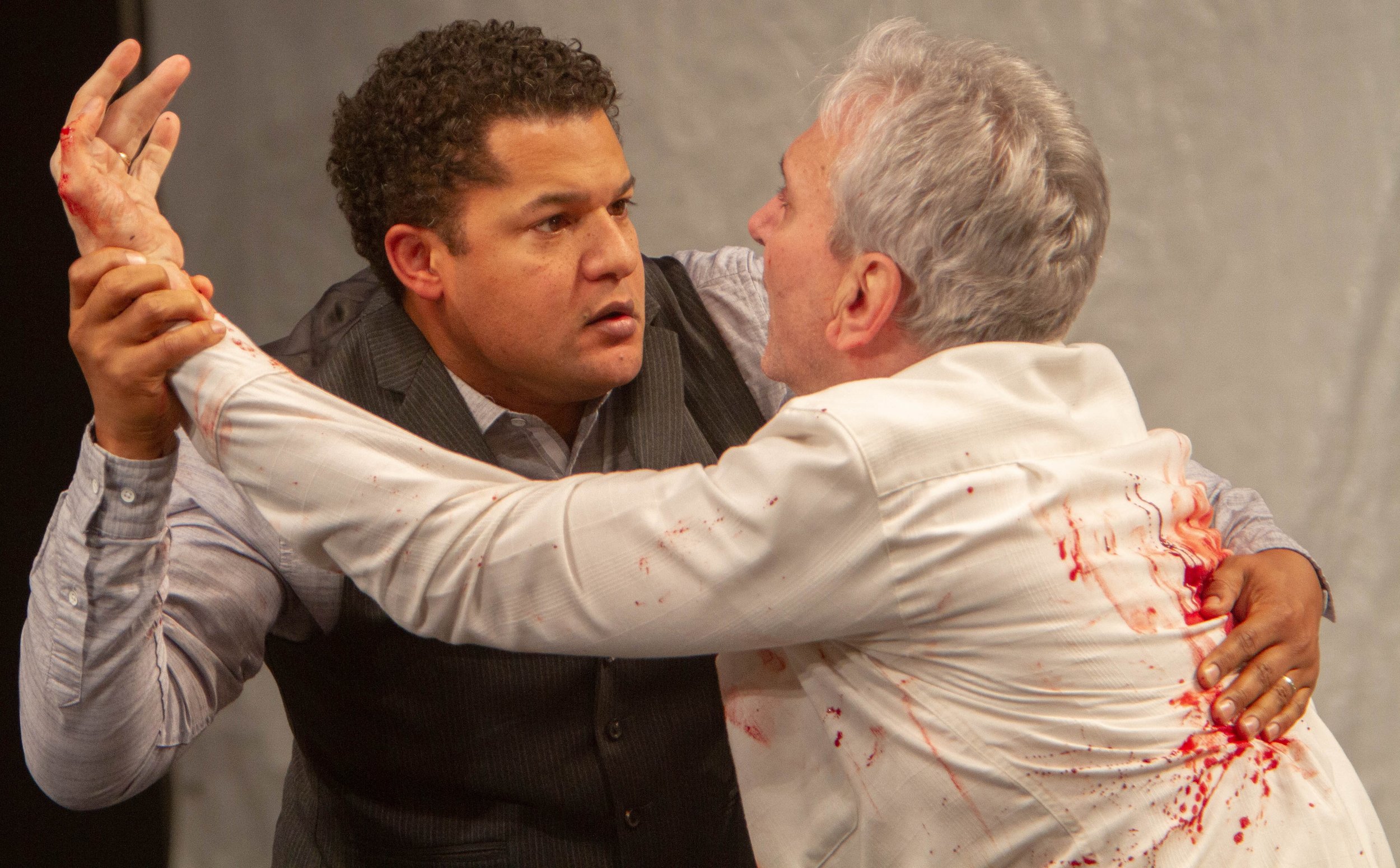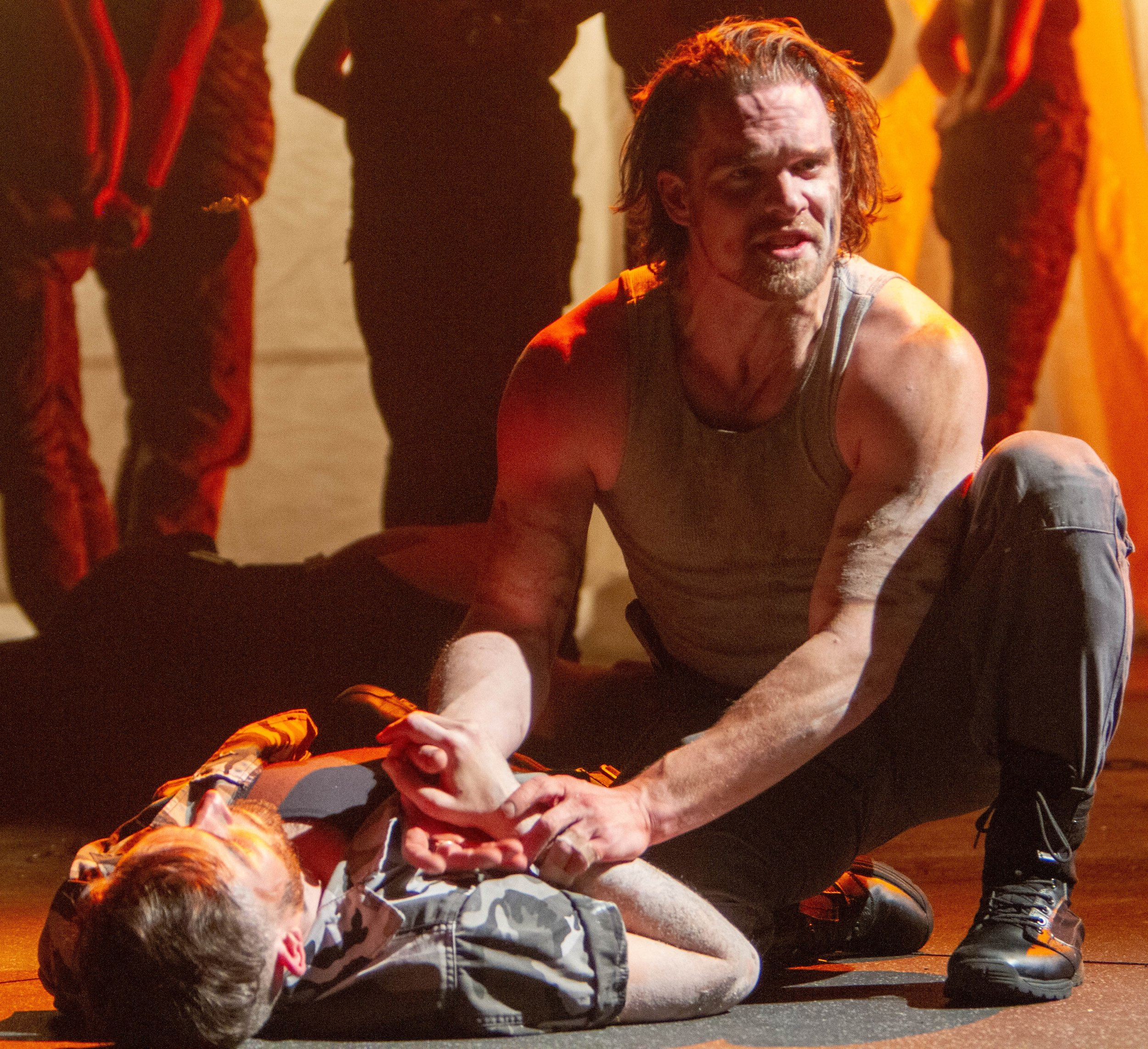In the opening moments of Theater for a New Audience’s The Tragedy of Julius Caesar, Metellus Cimber (Ted Deasy), one of the conspirators against Caesar, confronts a “mechanical,” or ordinary citizen, who is out on the street loudly celebrating the festival of Lupercal. Metellus ends up putting a chokehold on the man and then tossing him to the ground. The violent energy doesn’t let up for the next two hours and 40 minutes of a production that, at moments, is clear and invigorating, but at others sacrifices subtlety for movement and spectacle.
Matthew Amendt (left) plays Cassius and Brandon J. Dirden is Brutus in The Tragedy of Julius Caesar. Top: The mortally wounded Julius Caesar (Rocco Sisto) cries “Et tu, Brute!” to Brutus before he dies.
Shana Cooper, making her Off-Broadway directorial debut, with a production that originally appeared at the Oregon Shakespeare Festival, resists the often crude political analogies of recent productions of Julius Caesar, most notably the Trumpian Central Park offering of 2017. The setting and costumes are modern but unspecified. Sibyl Wickersheimer’s scenic design evokes a world in ruin and decay. The setting is nowhere, exactly: an intentionally unfinished stage, framed by two high walls of cracking plasterboard and plastic sheets, with props mostly consisting of plastic buckets and plenty of daggers.
There are no major set changes: the intimacy of Brutus’s house is identical to the streets of Rome. Christopher Akerlind’s lighting provides cues to new locations—intensely bright in the Senate, dim and ominous on the battlefield, for example. But Cooper has erased the sharp boundaries between the domestic and the political, the public and the private, that the play sets up. Shakespeare’s women in this play are largely relegated to that domestic sphere, so, in keeping with other recent productions, Cooper creates women characters out of traditionally male roles: in this case Cicero (Emily Dorsch), Artemidorus (Juliana Sass), and the Soothsayer (Michelle Hurst).
Caska (Stephen Michael Spencer) kneels over Cassius’s corpse. Photographs by Henry Grossman.
In addition to the scenic design, having the common people of Rome appear as masked figures conveys something timeless and mythic. But the lack of specificity runs the risk of plunging viewers entirely into abstraction and diminishing the stakes. The production becomes increasingly stylized, which produces some stellar moments—particularly Cinna the poet’s murder, which is gory and terrifying even though no one actually lays a hand on him—but becomes excessive after the intermission.
This isn’t to say that Cooper dispenses entirely with the psychological realism of the play. The first scene between Brandon J. Dirden’s confident and vigorous Brutus and Matthew Amendt’s scowling and somewhat shady Cassius crackles with intensity, each actor handling the language as simultaneously conversational and poetic. It is this scene in which Shakespeare announces his awareness of the unconscious, 300 years before Freud: “And since you know you cannot see yourself / So well as by reflection, I, your glass, / Will modestly discover to yourself / That of yourself which you yet know not of,” Cassius tells Brutus.
The funeral-oration scene is another highlight. Brutus delivers his perched high atop a scaffold, literally and figuratively above the common people. Mark Antony (Jordan Barbour) forgoes the scaffolding and delivers his beside Caesar’s corpse, among the people, with a grieving Calphurnia (an excellent Tiffany Rachelle Stewart) in a lone chair by the plastic-wrapped body. Eventually, Antony moves out toward the audience and speaks, and the power of his rhetorical maneuver registers viscerally. The sequence ends with Caesar (Rocco Sisto) rising and his bloody specter saluting the people.
The conspirators Cassius (left) and Caska have a heated discussion.
But outside of these expertly staged scenes, the production doesn’t offer much insight into the play’s most fundamental questions—on civic responsibility, loyalty, tyranny, extralegal violence, and so on—or the richness of its conflicting perspectives. One potentially provocative moment occurs during the assassination, when Brutus is unable to stab Caesar. Caesar utters “Et tu, Brute!” and then grabs Brutus and thrusts the dagger into himself. How this might affect Brutus’s place among the other conspirators is never really explored, though, and so the moment ends up feeling like simply the impulse to do something slightly different.
After the intermission the production loses much of its urgency and coherence. It’s always a challenge to stage the various battles, but the decision to do so via warlike dance sequences doesn’t resonate and goes on too long. Other, smaller decisions were puzzling as well, such as having Portia return as the battlefield poet in clown makeup.
Cooper’s TFANA production shines in moments, and it avoids a fashionable interpretive gimmick or an overly literal gloss on contemporary events. But it becomes abstract and frenetic, and we aren’t left with a firm sense of the play’s rich emotional and intellectual quandaries.
Theater for a New Audience’s The Tragedy of Julius Caesar runs through April 28 at the Polonsky Shakespeare Center (262 Ashland Place, Brooklyn). Evening performances are at 7:30 p.m. Tuesday through Sunday (there are select student matinees on some weekdays in lieu of a public performance); matinees are at 2 p.m. Saturday and Sunday. Tickets are available by calling (866) 811-4111 or visiting tfana.org.






